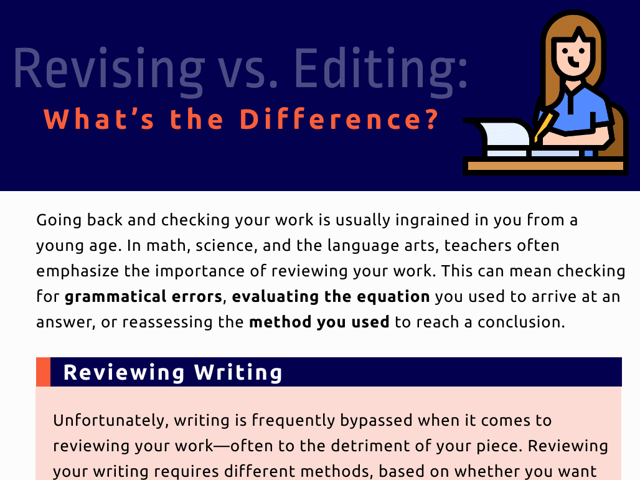
Revising vs. Editing: What’s the Difference?
Going back and checking your work is usually ingrained in you from a young age. In math, science, and the language arts, teachers often emphasize the importance of reviewing your work. This can mean checking for grammatical errors, evaluating the equation you used to arrive at an answer, or reassessing the method you used to reach a conclusion.
Reviewing Writing
Unfortunately, writing is frequently bypassed when it comes to reviewing your work—often to the detriment of your piece. Reviewing your writing requires different methods, based on whether you want to review your work as a whole, or review the individual components of a piece. These methods are known as revising and editing, respectively.
Revising
To revise a piece, you look at the overall tone, structure, and style. Revising brings about systemic change to a piece. When you revise, you evaluate the overall structure of your work: do the paragraphs flow in a cohesive, logical manner? Does the tone of the piece match your intended audience? Do you have enough evidence to support the ideas or claims you have made in your composition? The revision process gives you the opportunity to assess and address any issues your writing has with its overall structure, theme, and delivery.
Editing
Conversely, editing your work focuses on the smaller aspects of your writing. Editing hones in on your grammar, spelling, word choice, and conventions. Did you write in complete, well-constructed sentences? Do your sentences use the correct punctuation, and contain all of the parts of speech the sentence requires? Do you have any spelling errors that must be corrected? Did you choose the words and phrases that most effectively convey your point and purpose? If revising is the macro-review, editing is the micro-review, wherein you go over what you’ve written with a fine-toothed comb.
Revising vs. Editing
Although revising and editing are two different types of reviewing, neither is necessarily more important than the other. Each provide a vital function in polishing a piece, and both are a necessary part of writing, whether you are crafting an email to a prospective employer, or constructing a 10-page essay for a college course. Revising and editing allow you to go back over what you’ve written and improve upon anything you may have missed previously. Both are usually best done after stepping away from the work in question for a time, in order to view what you’ve written with a fresh and (as much as possible) unbiased perspective.
Keep Reading

ACT Blog
Essay Writing Practice and Prompts for the ACT
The ACT writing test is an optional exam, and is not always given as pa…

ACT Blog
How to Do Well on the ACT Essay
Understanding the ACT Essay Before diving into strategies to excel, it…

ACT Blog
How to Study for the ACT in One Week
Getting ready for American College Testing (the ACT) can be a source of…